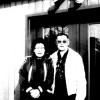Project Jukebox Survey
Help us redesign the Project Jukebox website by taking a very short survey!
Bertha Moses

Bertha Moses was an Iñupiaq elder from Alatna and Allakaket, Alaska. She was born in 1930 in Alatna, the Iñupiaq (Eskimo) village directly across the Koyukuk River from Allakaket. Her parents were Cora Tobuk and Oscar Nictune. Her grandparents, Tiluq (or Dinook) and Tuvaq (or Tobuk) on her mother's side and Tikitchuak (or Dickachalk) and Niuqtuun (Nickdoon or Peter Nictune) on her father's side, who lived in Alatna and in camps on the Alatna River, were important to her growing up. In fact as a small child, she lived part of the time in camp with her father's parents. Bertha was the fourth of ten children, including seven girls and three boys. One brother and one sister died while she was growing up. Her mother died in October 1942 while giving birth to two additional children, twins who did not survive. Before her mother died, Bertha's family spent a lot of time in camp away from the village. Her father had camps on the Alatna River where they went fishing in the fall and trapping in the winter.
After her mother's death, the family spent more time in town and Bertha had a better chance to go to school. Her father felt schooling was very important, and even when they were in their camp near Black Jack, he helped his kids learn to read from old magazines. After her mother's death, the older sisters, including Bertha took on the tasks of running the household and looking after the younger children until one by one they were married. Bertha liked to drive the dog team, haul wood, hunt, and do other outdoor work. Her older brother was already grown and married, her younger brother was way too young to hunt, and her father worked small seasonal jobs, trapped and hunted, which kept him away from home part of the time, so many responsibilities that usually were done by the men, fell to her. After she married, Bertha missed the company of her sisters and the freedom of having her own dogs. Bertha really liked school. Although traveling to camp and, later as a teenager, taking care of her siblings sometimes kept her away, she has many good memories of school, and the missionary school teacher who lived in Allakaket for many years, Miss. Bessie Kay. The Mission was also a significant part of Bertha's family's life. Throughout her growing up years, Miss Kay, and Miss Amelia Hill, a nurse, were the local missionaries. Bertha remembered Miss Hill, who conducted the Sunday services, with particular fondness, and spoke of both women as almost like parents, especially to those youngsters like herself who had lost a parent. Miss Hill was undoubtedly an important influence on Bertha, perhaps even a role model, given Bertha's success as a health care worker.
When she was eighteen, Bertha married Johnson Moses from Allakaket. In their early years, they lived away from the village at seasonal camps, but as their family grew this was increasingly difficult and Johnson did not like leaving Bertha alone at camp while he was out hunting and trapping. They eventually moved into a cabin in town that Johnson built. Johnson and Bertha had eleven children.
In 1958, Bertha received some first aid and health care training from a visiting nurse. Soon she became a community health aide and from 1958-1969 she served her village as a volunteer health aide, gradually gaining more training and experience. She learned to suture, deliver babies, and deal with seizures, fractures and all sorts of accidents. For some time she worked out of little more than a medicine cabinet on the wall in her home. Many of her experiences as a health aide were very demanding. Finally in 1969, she began being paid for her work as a health aide. Eventually, with additional training every year, she became a community health practitioner. During the 1950s and early 1960s, she also worked as a clerk, and later the manager of the local store in Allakaket.
In 1983, Bertha was asked to serve as the first manager of the Tanana Chiefs Patient Hostel in Fairbanks, an apartment facility located next to the hospital for patients from outlying communities coming to Fairbanks for medical care. She scheduled visits by patients and their families, coordinated a small staff, and provided information and comfort for those who stayed there. In this position, people benefited from all her years of experience in health care as well as her unique ability to talk with and help people dealing with various problems. When they retired, Bertha and Johnson returned to live in Allakaket. Bertha Moses passed away in 2009.
More information about Bertha's family is available in her father's life history, Oscar Nictune -- A Biography: Alatna by Curt Madison and Yvonne Yarber for the Yukon Koyukuk School District and published by Hancock House, North Vancouver, British Columbia in 1980.
